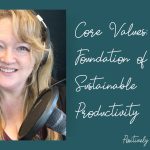A positive approach is essential no matter what you come up against in life, and cultivating positive thinking can be a lifesaver when dealing with dark times. Please don’t confuse positive thinking with toxic positivity, which denies our struggles. Healthy, positive thinking is a tool that helps us navigate our way through difficult times. This week, episode 248 of the Positively LivingⓇ Podcast is about how to find light when the world feels dark!
In this episode of the Positively LivingⓇ Podcast, I share insights on how to use positive psychology to cope with adversity and build resilience, including steps to take to build the tools to help you navigate difficult times.
Key Takeaways:
- The difference between toxic positivity and using positive psychology, which allows you to acknowledge and process your feelings while building healthy coping mechanisms.
- Defining optimism and hope, which are skills that can be learned and strengthened over time.
- Six things you can do to cultivate optimism and hope in your life.
The Danger of Toxic Positivity
The phrase “good vibes only” might sound appealing on the surface, but it represents a dangerous trend: toxic positivity. This approach dismisses genuine emotions, invalidates pain, and can actually worsen the experience of suffering. Telling someone to “just look on the bright side” when they’re struggling is not only insensitive but also counterproductive. It prevents them from fully processing their emotions, which is essential for healing.
True positivity acknowledges the reality of pain and suffering while simultaneously seeking tools to navigate through it. It’s about finding a balance between acknowledging difficult emotions and cultivating hope for the future.
This balanced approach is at the core of trauma-informed and grief-informed living, recognizing that healing is a process that requires respecting individual timelines and experiences.
Positive Psychology: Your Toolkit for Resilience
Instead of avoiding the darkness, the key is to equip yourself with tools to navigate through it. Think of these tools as a metaphorical flashlight, illuminating the path forward when you feel lost.
This approach is rooted in positive psychology, a field that focuses on strengths, virtues, and optimal functioning. Positive psychology isn’t about fixing what’s wrong but building a good life, even amidst challenges. It emphasizes cultivating skills like hope and optimism, which are essential for resilience.
By focusing on solutions and fostering positive emotions, positive psychology helps you find meaning and purpose, even in the face of adversity.
Learned Optimism: A Skill You Can Develop
One of the most empowering aspects of positive psychology is the idea that optimism and hope can be learned. These aren’t fixed traits; they’re skills that can be developed through practice.
Martin Seligman, a pioneer in positive psychology, emphasizes that learned optimism is about how we interpret the world. It’s not about changing reality but about changing our perspective. By challenging our automatic negative thoughts, we can shift our outlook and cultivate a more optimistic mindset.
Similarly, hope is not just a passive emotion; it’s an active mindset. It involves setting goals, identifying pathways to achieve them, and maintaining a positive outlook even when faced with obstacles. The combination of learned optimism and cultivated hope creates a powerful force for resilience, improving both mental and physical well-being.
Practical Strategies for Cultivating Hope and Optimism
So, how do you actually learn these skills? Here are six practical strategies you can implement in your daily life:
- Gratitude: Practicing gratitude, even during difficult times, can be incredibly powerful. It’s not about ignoring the pain; it’s about acknowledging the good that still exists. Even small moments of gratitude can build over time, creating a more positive outlook. The more you look for things to be grateful for, the more you will find.
- Positivity and Kindness: Surrounding yourself with positive influences and extending kindness to others can significantly impact your own mindset. Positivity, like negativity, is contagious. By sharing positivity and helping others, you not only lift their spirits but also boost your own.
- Self-Compassion: Be kind to yourself. Acknowledge your pain and treat yourself with the same compassion you would offer a friend. Recognize that it’s okay to struggle and that healing takes time. Self-compassion is essential for both resilience and productivity.
- Self-Care: Prioritizing self-care is crucial for well-being. It’s not a luxury; it’s a necessity. Taking care of your physical and mental needs can significantly impact your ability to cope with challenges and find light in the darkness. Even simple acts of self-care, like getting enough sleep or eating nourishing food, can make a difference.
- Journaling: Journaling provides a space to process your thoughts and emotions. It can help you identify negative thought patterns and work through them. Whether you prefer pen and paper or digital tools, journaling can be a valuable tool for self-reflection and growth.
- Affirmations: Affirmations are positive statements that can help reprogram your mind. While they might seem a bit “woo-woo” to some, they can be a powerful tool for shifting your perspective. The key is to make them realistic and meaningful to you. Repeat them regularly to counteract negative self-talk.
You Are Not Alone
Finding light in the darkness is a journey, not a destination. It’s about acknowledging the pain, cultivating hope, and developing the skills to navigate through challenges. Remember that you are not alone in this. We are all in this together. By sharing our experiences and supporting each other, we can create a community of resilience and hope. If you found this helpful, please share it with others. Let’s encourage each other and spread the light.
Learn more about Positively LivingⓇ and Lisa at https://positivelyproductive.com/podcast/
Could you use some support? The Quickstart Coaching session is a way to get to know your productivity path, fast! A speed-round strategy session is perfect for a quick win and to see what coaching can do, the Quickstart will encourage and inspire you to take intentional, effective action! Go to https://www.positivelyproductive.com/plpquick for a special listener discount!
CONNECT WITH LISA ZAWROTNY:
LINKS MENTIONED IN THIS EPISODE:
(Find links to books/gear on the Positively Productive Resources Page.)
Ep 8: Toxic Positivity with Valerie Friedlander
Ep 46: Help Yourself by Helping Others with Jake Doherty
Ep 114: Harmful Mindset Approaches with Valerie Friedlander
Ep 146: 10 Simple Self-Care Ideas [Round Up]
Ep 153: Coping with Grief by Giving Back with Lindsay Taylor
Dance Song Playlist V1, V2, V3
Music by Ian and Jeff Zawrotny
Start your own podcast with Buzzsprout!











